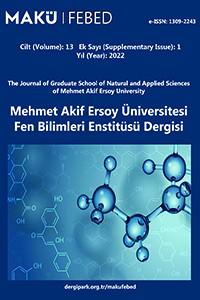Research Article
Year 2022,
Volume: 13 Issue: Ek (Suppl.) 1, 382 - 387, 31.12.2022
Abstract
Günümüzde elektrikli cihazların yoğun kullanımı ile elektriğe olan ihtiyaç artmıştır. Bu ihtiyacı karşılamak için genellikle fosil yakıtlar kullanılmaktadır. Ancak fosil yakıtların çevreye verdiği zararı azaltmak için hükümetler yenilenebilir enerji kaynaklarına çeşitli teşvikler sunmaktadır. Bu kapsamda güneş enerjisi santrallerine yönelik teşvikler de oldukça fazladır. Son zamanlarda birçok yatırımcı güneş enerjisi santrali kurmak istemektedir. Güneş enerjisi santrali kurmak yüksek yatırım maliyeti gerektirdiğinden amortisman sürelerinin hesaplanabilmesi yatırım kararı vermekte önemli rol oynamaktadır. Teknolojinin gelişmesi, bu maliyetlerin amortisman sürelerini yapay zekâ algoritmaları ile tahmin etmeyi mümkün kılmıştır. Bu çalışmada, gerçek güneş enerjisi santrali verileri kullanılarak, derin öğrenme algoritmaları ile gelecekte üretilebilecek enerji verileri tahmin edilmiştir. Veriler, Humartaş Enerji firmasına ait güneş enerjisi santrallerinden alınmıştır. Çalışmada zaman serisi algoritmalarında yoğunlukla kullanılan LSTM (Long Short-Term Memory, Uzun Kısa Süreli Bellek) yöntemi kullanılarak analizler ve tahminler yapılmıştır. Çalışmanın hata oranı %1 ile %17 arasında olduğu görülmüştür. Bu çalışmanın rüzgâr, hidrolik, jeotermal enerji gibi diğer yenilenebilir enerji kaynakları içinde kullanılabileceği öngörülmektedir.
References
- Acaroğlu, H., & Güllü, M. (2022). Climate change caused by renewable and non-renewable energy consumption and economic growth: A time series ARDL analysis for Turkey. Renewable Energy.
- Dam, M. M. (2014). Sera gazı emisyonlarının makroekonomik değişkenlerle ilişkisi: OECD ülkeleri için panel veri analizi (Doctoral dissertation, Adnan Menderes Üniversitesi).
- Konstantinou, M., Peratikou, S., & Charalambides, A. G. (2021). Solar photovoltaic forecasting of power output using lstm networks. Atmosphere, 12(1), 124.
- Landi, F., Baraldi, L., Cornia, M., & Cucchiara, R. (2021). Working memory connections for LSTM. Neural Networks, 144, 334-341.
- Moor, J. (2006). The Dartmouth College artificial intelligence conference: The next fifty years. Ai Magazine, 27(4), 87-87.
- Özen, F. (2019). YENİLENEBİLİR ENERJİDE YAPAY ZEKA UYGULAMALARI.
- Pulver, A., & Lyu, S. (2017, May). LSTM with working memory. In 2017 International Joint Conference on Neural Networks (IJCNN) (pp. 845-851). IEEE.
- Sacco, C., Radwan, AB, Anderson, A., Harik, R. ve Gregory, E. (2020). Kompozit üretiminde makine öğrenimi: Otomatik fiber yerleştirme denetimine ilişkin bir vaka çalışması. Kompozit Yapılar, 250, 112514.
- Sherstinsky, A. (2020). Fundamentals of recurrent neural network (RNN) and long short-term memory (LSTM) network. Physica D: Nonlinear Phenomena, 404, 132306.
- URL-1, 2020. Güneş. www.enerji.gov.tr/bilgi merkezi-enerji-gunes, (Erişim Tarihi: 10.11.2021).
- URL-2, 2015. Understanding LSTM Networks. http://colah.github.io/posts/2015-08-Understanding-LSTMs/,(Erişim Tarihi: 05.12.2021).
- Van Der Westhuizen, J., & Lasenby, J. (2018). The unreasonable effectiveness of the forget gate. arXiv preprint arXiv:1804.04849.
- Yu, Y., Si, X., Hu, C., & Zhang, J. (2019). A review of recurrent neural networks: LSTM cells and network architectures. Neural computation, 31(7), 1235-1270.
Year 2022,
Volume: 13 Issue: Ek (Suppl.) 1, 382 - 387, 31.12.2022
Abstract
Today, with the intensive use of electrical devices, the need for electricity has increased. Fossil fuels are generally used to meet this need. However, to reduce the damage caused by fossil fuels to the environment, governments offer various incentives to renewable energy sources. In this context, incentives for solar power plants are also quite high. Recently, many investors wanted to establish a solar power plant. Since establishing a solar power plant requires high investment costs, the calculation of amortization periods plays an important role in making investment decisions. The development of technology has made it possible to predict the amortization times of these costs with artificial intelligence algorithms. In this study, energy data that can be produced in the future have been estimated with deep learning algorithms using real solar power plant data. The data were taken from solar power plants belonging to Humartaş Energy company. In the study, analyzes and predictions were made using the LSTM (Long Short-Term Memory) method, which is used extensively in time series algorithms. The error rate of the study was found to be between 1% and 17%. It is predicted that this study can be used in other renewable energy sources such as wind, hydraulic, geothermal energy.
References
- Acaroğlu, H., & Güllü, M. (2022). Climate change caused by renewable and non-renewable energy consumption and economic growth: A time series ARDL analysis for Turkey. Renewable Energy.
- Dam, M. M. (2014). Sera gazı emisyonlarının makroekonomik değişkenlerle ilişkisi: OECD ülkeleri için panel veri analizi (Doctoral dissertation, Adnan Menderes Üniversitesi).
- Konstantinou, M., Peratikou, S., & Charalambides, A. G. (2021). Solar photovoltaic forecasting of power output using lstm networks. Atmosphere, 12(1), 124.
- Landi, F., Baraldi, L., Cornia, M., & Cucchiara, R. (2021). Working memory connections for LSTM. Neural Networks, 144, 334-341.
- Moor, J. (2006). The Dartmouth College artificial intelligence conference: The next fifty years. Ai Magazine, 27(4), 87-87.
- Özen, F. (2019). YENİLENEBİLİR ENERJİDE YAPAY ZEKA UYGULAMALARI.
- Pulver, A., & Lyu, S. (2017, May). LSTM with working memory. In 2017 International Joint Conference on Neural Networks (IJCNN) (pp. 845-851). IEEE.
- Sacco, C., Radwan, AB, Anderson, A., Harik, R. ve Gregory, E. (2020). Kompozit üretiminde makine öğrenimi: Otomatik fiber yerleştirme denetimine ilişkin bir vaka çalışması. Kompozit Yapılar, 250, 112514.
- Sherstinsky, A. (2020). Fundamentals of recurrent neural network (RNN) and long short-term memory (LSTM) network. Physica D: Nonlinear Phenomena, 404, 132306.
- URL-1, 2020. Güneş. www.enerji.gov.tr/bilgi merkezi-enerji-gunes, (Erişim Tarihi: 10.11.2021).
- URL-2, 2015. Understanding LSTM Networks. http://colah.github.io/posts/2015-08-Understanding-LSTMs/,(Erişim Tarihi: 05.12.2021).
- Van Der Westhuizen, J., & Lasenby, J. (2018). The unreasonable effectiveness of the forget gate. arXiv preprint arXiv:1804.04849.
- Yu, Y., Si, X., Hu, C., & Zhang, J. (2019). A review of recurrent neural networks: LSTM cells and network architectures. Neural computation, 31(7), 1235-1270.
There are 13 citations in total.
Details
| Primary Language | Turkish |
|---|---|
| Subjects | Engineering |
| Journal Section | Research Paper |
| Authors | |
| Publication Date | December 31, 2022 |
| Acceptance Date | November 27, 2022 |
| Published in Issue | Year 2022 Volume: 13 Issue: Ek (Suppl.) 1 |


